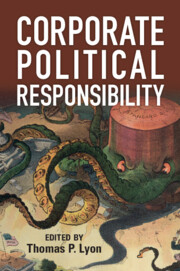Book contents
- Corporate Political Responsibility
- Reviews
- Corporate Political Responsibility
- Copyright page
- Contents
- Figures
- Tables
- Contributors
- Preface
- Section I Foundations of Corporate Political Responsibility: Metrics for Disclosure and Good Governance
- Section II Transparency: Causes and Consequences
- Section III Accountability: Linking Corporate Social Responsibility, Employee Relations, and Corporate Political Responsibility
- 6 Responsible Lobbyists?
- 7 License to Give
- 8 Multinational Companies as Responsible Political Actors in Global Business
- Section IV Responsibility: Corporate Political Responsibility and Climate
- Section V Implementing Corporate Political Responsibility: Opportunities and Challenges
- Index
- References
8 - Multinational Companies as Responsible Political Actors in Global Business
Challenges and Implications for Human Resource Management
from Section III - Accountability: Linking Corporate Social Responsibility, Employee Relations, and Corporate Political Responsibility
Published online by Cambridge University Press: 16 November 2023
- Corporate Political Responsibility
- Reviews
- Corporate Political Responsibility
- Copyright page
- Contents
- Figures
- Tables
- Contributors
- Preface
- Section I Foundations of Corporate Political Responsibility: Metrics for Disclosure and Good Governance
- Section II Transparency: Causes and Consequences
- Section III Accountability: Linking Corporate Social Responsibility, Employee Relations, and Corporate Political Responsibility
- 6 Responsible Lobbyists?
- 7 License to Give
- 8 Multinational Companies as Responsible Political Actors in Global Business
- Section IV Responsibility: Corporate Political Responsibility and Climate
- Section V Implementing Corporate Political Responsibility: Opportunities and Challenges
- Index
- References
Summary
Multinational corporations (MNCs) assume political responsibilities by contributing to national and global governance, influencing their legal and moral environments, and addressing sustainability issues. Scholars have developed various frameworks, most prominently corporate political activity (CPA), corporate citizenship (CC), political corporate social responsibility (PCSR), and corporate political responsibility (CPR), for theorizing the political role and responsibility of the corporation. This chapter analyzes the challenges of MNCs, advances their political responsibility, and explores the implications for theorizing about human resource management (HRM). We propose HRM should be extended to include a political agenda along two functions: as a “steward” taking care for the wellbeing of the firm’s work force and as an “enabler” making organizational members competent for helping others. On that basis, we offer a perspective on how political HRM can be conceived of in the CPR approach and contribute to its development.
Keywords
- Type
- Chapter
- Information
- Corporate Political Responsibility , pp. 216 - 244Publisher: Cambridge University PressPrint publication year: 2023



